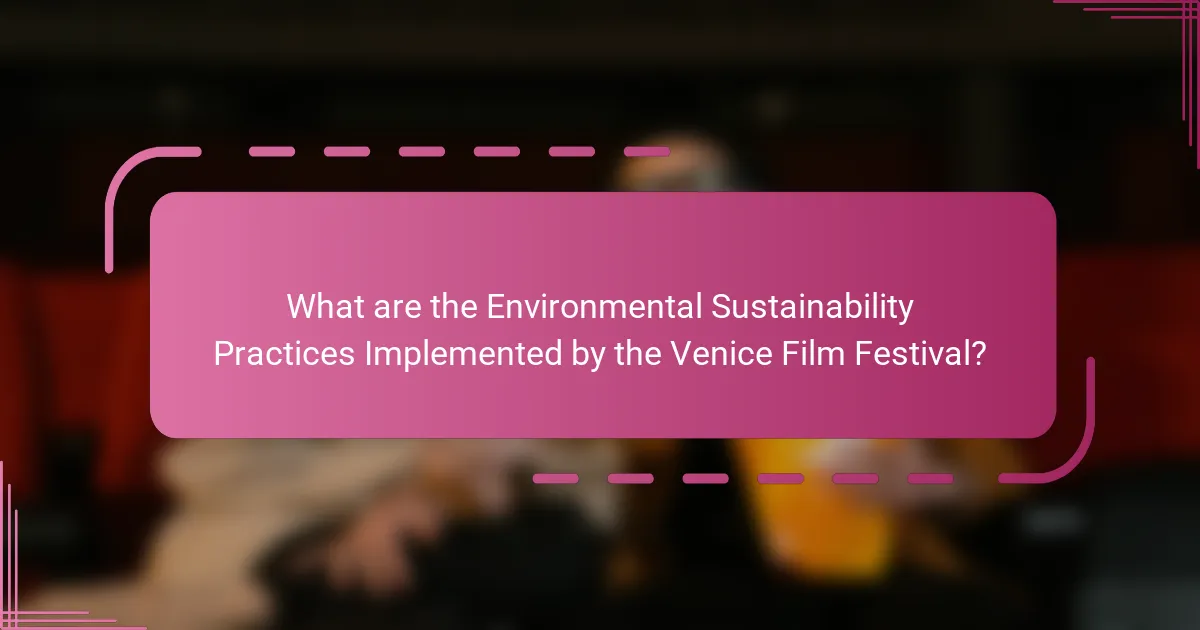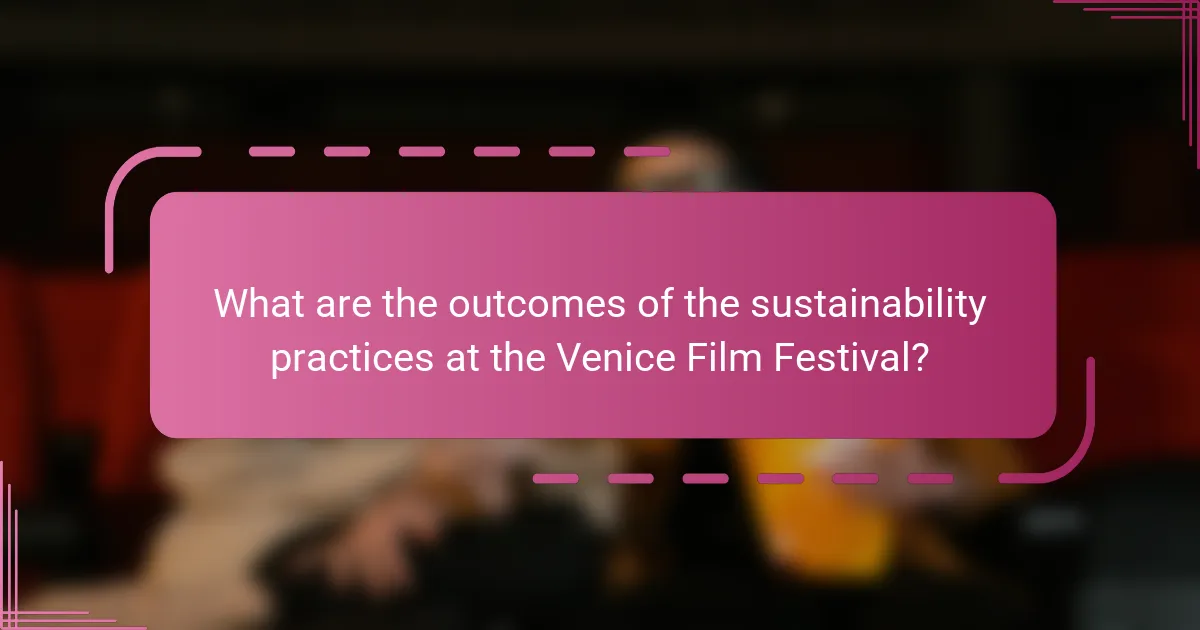The Venice Film Festival is implementing various environmental sustainability practices aimed at reducing its carbon footprint. Key initiatives include the use of renewable energy sources, waste reduction through recycling and composting, and promoting sustainable transportation options like electric shuttles. The festival collaborates with local organizations to support biodiversity and employs water conservation measures. Outcomes of these practices show a measurable decrease in waste and increased awareness of environmental issues among attendees. Future goals focus on further reducing carbon emissions, enhancing renewable energy use, and fostering collaborations with sustainability-focused organizations to promote eco-friendly practices within the film industry.

What are the Environmental Sustainability Practices Implemented by the Venice Film Festival?
The Venice Film Festival implements several environmental sustainability practices. It aims to reduce its carbon footprint through various initiatives. The festival uses renewable energy sources to power its events. It promotes waste reduction by encouraging recycling and composting. Sustainable transportation options are provided for attendees, including electric shuttles. The festival also collaborates with local organizations to support biodiversity. Water conservation measures are in place to minimize usage. Lastly, the festival raises awareness about environmental issues through its programming and partnerships.
How did the Venice Film Festival begin its journey towards sustainability?
The Venice Film Festival began its journey towards sustainability by implementing eco-friendly practices in 2012. Initially, the festival focused on reducing waste and promoting recycling. It introduced measures such as digital ticketing to minimize paper usage. The festival also partnered with local organizations to promote sustainable transportation options for attendees. In 2019, the festival launched the “Green Carpet” initiative to highlight environmentally conscious films. This initiative encourages filmmakers to address sustainability themes in their work. Additionally, the festival has committed to reducing its carbon footprint through various environmental assessments. These steps mark the festival’s ongoing commitment to sustainability in the film industry.
What motivated the Venice Film Festival to adopt sustainability practices?
The Venice Film Festival adopted sustainability practices due to increasing environmental concerns. The festival aimed to minimize its ecological footprint. This initiative aligns with global movements towards sustainability in the film industry. In 2020, the festival announced its commitment to reducing waste and carbon emissions. It also sought to promote awareness about environmental issues among attendees. The festival’s motivation included the desire to set an example for other events. Collaborations with environmental organizations further supported this goal. Overall, the Venice Film Festival recognized the importance of sustainability in modern filmmaking.
What milestones has the festival achieved in its sustainability efforts?
The Venice Film Festival has achieved several significant milestones in its sustainability efforts. It implemented a comprehensive waste management system, reducing waste by 30% since 2019. The festival also transitioned to using 100% renewable energy sources for all its operations. Additionally, it partnered with local organizations to promote biodiversity and protect the surrounding lagoon ecosystem. The festival has also introduced a carbon offset program, successfully offsetting over 1,000 tons of CO2 emissions in the last event. These milestones reflect the festival’s commitment to environmental sustainability and responsible event management.
What specific sustainability practices are being implemented?
The Venice Film Festival implements several specific sustainability practices. These include using renewable energy sources for event operations. The festival also promotes waste reduction through recycling and composting initiatives. Additionally, it encourages the use of sustainable transportation options for attendees. The festival collaborates with local organizations to support biodiversity. It also prioritizes sustainable catering practices, sourcing local and organic food. Finally, the festival raises awareness about environmental issues through its programming and outreach efforts. These practices demonstrate a commitment to reducing the environmental impact of the event.
How does the Venice Film Festival manage waste and recycling?
The Venice Film Festival manages waste and recycling through a comprehensive waste management system. This system includes segregating waste at source to promote recycling. The festival provides clearly marked bins for different types of waste, such as plastics, paper, and organic materials. Additionally, the festival collaborates with local waste management companies to ensure proper disposal and recycling processes. Educational programs are also implemented to raise awareness among attendees about waste reduction practices. In 2021, the festival achieved a significant increase in recycling rates, demonstrating its commitment to sustainability.
What energy-efficient measures are in place at the festival?
The Venice Film Festival implements several energy-efficient measures. They use renewable energy sources, such as solar panels, to power festival activities. Energy-efficient lighting is installed throughout the venue to reduce electricity consumption. The festival promotes the use of electric vehicles for transportation to and from the event. Additionally, organizers encourage attendees to utilize public transportation options. Waste management practices focus on recycling and composting to minimize environmental impact. These measures collectively contribute to the festival’s commitment to sustainability.
How does the festival promote sustainable transportation options?
The festival promotes sustainable transportation options by encouraging the use of public transport and bicycles. It provides information on local transit routes and schedules. The festival collaborates with local authorities to enhance public transport services during the event. Shuttle services are offered to reduce individual car use. The festival also features designated bike parking areas to accommodate cyclists. Eco-friendly transportation initiatives are highlighted in promotional materials. This approach aligns with the festival’s commitment to reducing its carbon footprint.
What partnerships and collaborations support the festival’s sustainability initiatives?
The Venice Film Festival collaborates with various organizations to enhance its sustainability initiatives. Partnerships include collaborations with environmental NGOs and local government bodies. These partnerships aim to implement eco-friendly practices throughout the festival. For instance, the festival works with organizations focused on waste reduction and recycling. Collaborations also extend to sponsors committed to sustainability. The festival promotes green transportation options through partnerships with local transit authorities. Additionally, the festival engages with sustainable catering services to minimize its environmental footprint. These collaborations ensure a comprehensive approach to sustainability at the event.
Who are the key partners involved in the Venice Film Festival’s sustainability efforts?
The key partners involved in the Venice Film Festival’s sustainability efforts include various organizations and companies. Notable partners are the Italian Ministry of the Environment and the City of Venice. Additionally, collaborations with environmental NGOs enhance sustainability initiatives. The festival also engages with local businesses to promote eco-friendly practices. These partnerships support waste reduction and energy efficiency measures. The involvement of these entities underscores a collective commitment to environmental responsibility.
How do collaborations enhance the festival’s environmental impact?
Collaborations enhance the festival’s environmental impact by pooling resources and expertise. Partnering with environmental organizations leads to the implementation of best practices. These collaborations often result in innovative waste management solutions. For instance, the festival has worked with local recycling companies to improve waste separation. This effort has increased recycling rates by up to 30%. Collaborations also help in promoting sustainable transportation options for attendees. By working with local transit authorities, the festival encourages the use of public transport. This reduces carbon emissions associated with travel to the event. Overall, collaborations create a more comprehensive approach to sustainability. They enable the festival to achieve greater environmental goals than it could alone.

What are the outcomes of the sustainability practices at the Venice Film Festival?
The outcomes of the sustainability practices at the Venice Film Festival include reduced carbon emissions and increased awareness of environmental issues. The festival implemented initiatives such as waste reduction and sustainable transportation. These efforts led to a measurable decrease in waste generated during the event. Additionally, the festival promoted the use of eco-friendly materials and encouraged participants to adopt sustainable practices. Surveys indicated that attendees reported heightened awareness of sustainability in the film industry. The festival’s commitment to sustainability has inspired similar initiatives at other film festivals globally. Overall, the Venice Film Festival serves as a model for integrating environmental responsibility within major cultural events.
How do these practices influence the local community and environment?
Environmental sustainability practices implemented by the Venice Film Festival positively influence the local community and environment. These practices promote eco-friendly initiatives, reducing waste and carbon footprints. For instance, the festival has adopted measures like using renewable energy sources and implementing recycling programs. These efforts help to preserve the local ecosystem and reduce pollution levels. Additionally, community engagement in sustainability initiatives fosters awareness and education about environmental issues. The festival’s commitment to sustainability can inspire other events and organizations to adopt similar practices. This ripple effect can lead to broader community involvement in environmental conservation efforts. Ultimately, these practices contribute to a healthier and more sustainable local environment.
What positive effects have been observed in Venice’s ecosystem?
The positive effects observed in Venice’s ecosystem include improved water quality and increased biodiversity. Reduced boat traffic during events has led to clearer waters. This clarity allows sunlight to penetrate deeper, promoting aquatic plant growth. Enhanced vegetation provides habitats for various species. Increased fish populations have been noted, benefiting local fisheries. Additionally, reduced pollution levels contribute to healthier wildlife. These changes reflect the impact of sustainability practices implemented during events like the Venice Film Festival.
How does the festival engage attendees in sustainability efforts?
The festival engages attendees in sustainability efforts through various initiatives. It promotes recycling and waste reduction by providing designated bins throughout the venue. Attendees are encouraged to use public transportation or shared rides to minimize carbon emissions. The festival also incorporates educational workshops on sustainability topics. Additionally, it partners with local environmental organizations to raise awareness. These actions aim to foster a culture of sustainability among participants. The festival’s commitment to sustainability is evident in its operational practices and attendee involvement.
What recognition has the Venice Film Festival received for its sustainability efforts?
The Venice Film Festival has received the Green Film Network Award for its sustainability efforts. This recognition highlights the festival’s commitment to reducing its environmental impact. The award was given for implementing eco-friendly practices. These practices include waste management, energy efficiency, and promoting sustainable transportation. Additionally, the festival has been acknowledged for its collaboration with local environmental organizations. This collaboration aims to enhance awareness of sustainability in the film industry. The festival’s initiatives set a benchmark for other film festivals globally.
What awards or certifications has the festival earned?
The Venice Film Festival has earned several awards and certifications for its environmental sustainability practices. It received the ISO 20121 certification, which recognizes sustainable event management. Additionally, the festival has been awarded the Green Event Certificate for its commitment to eco-friendly initiatives. It also won the Green Film Festival Award, highlighting its efforts in promoting sustainability in the film industry. These recognitions reflect the festival’s dedication to reducing its environmental impact and promoting green practices.
How does recognition impact the festival’s reputation and future initiatives?
Recognition enhances the festival’s reputation and influences future initiatives positively. A strong reputation attracts more attendees and sponsors. Increased visibility can lead to greater media coverage. This in turn encourages partnerships with environmentally focused organizations. Successful initiatives can be showcased as models for sustainability. Historical data shows that recognized festivals often see increased funding for eco-friendly projects. For example, the Venice Film Festival has received accolades for its sustainability efforts, which have led to expanded green initiatives. Such recognition fosters a commitment to continuous improvement in environmental practices.

What are the future goals for sustainability at the Venice Film Festival?
The future goals for sustainability at the Venice Film Festival include reducing carbon emissions and promoting eco-friendly practices. The festival aims to achieve a significant reduction in waste generation by implementing recycling initiatives. Additionally, they plan to enhance the use of renewable energy sources at event venues. The festival is also focused on raising awareness about environmental issues among attendees and participants. Collaborations with sustainability-focused organizations will be prioritized to further these goals. The festival’s commitment to sustainability reflects a broader trend in the film industry towards environmental responsibility.
What upcoming initiatives are planned to enhance sustainability practices?
The Venice Film Festival plans several initiatives to enhance sustainability practices. These initiatives include implementing a carbon offset program for all attendees. Additionally, the festival aims to increase the use of renewable energy sources at event venues. A commitment to reducing single-use plastics is also part of their strategy. The festival will partner with local organizations to promote sustainable transportation options. Furthermore, they plan to host workshops on sustainability for filmmakers and attendees. These initiatives reflect the festival’s dedication to environmental responsibility.
How will technology play a role in future sustainability efforts?
Technology will significantly enhance future sustainability efforts by optimizing resource management and reducing waste. Smart technologies can monitor energy consumption in real-time, leading to efficient usage. For instance, IoT devices can track and reduce water usage in agriculture, minimizing wastage. Renewable energy technologies, such as solar panels and wind turbines, will provide cleaner energy sources. Blockchain can improve supply chain transparency, ensuring sustainable sourcing of materials. Data analytics can identify patterns and predict environmental impacts, guiding better decision-making. According to a report by the International Energy Agency, digital technologies could help reduce global CO2 emissions by up to 4 billion tons annually by 2030. These advancements will empower organizations and individuals to adopt more sustainable practices effectively.
What long-term goals does the festival aim to achieve in sustainability?
The festival aims to achieve significant reductions in its carbon footprint. It seeks to implement renewable energy sources for all festival operations. The festival also targets waste reduction through comprehensive recycling programs. It aims to promote sustainable transportation options for attendees. The festival plans to engage local communities in sustainability initiatives. It will focus on educating participants about environmental impact. The festival aspires to become a model for other events in the industry. These goals contribute to broader climate action efforts globally.
What can other film festivals learn from the Venice Film Festival’s sustainability practices?
Other film festivals can learn the importance of integrating sustainability into their operational frameworks from the Venice Film Festival. The festival has implemented measures such as waste reduction initiatives, including recycling and composting programs. They have also prioritized sustainable transportation options for attendees. The Venice Film Festival has partnered with local organizations to promote environmental awareness and education. Additionally, they focus on using eco-friendly materials for promotional items and event setups. These practices not only reduce the festival’s carbon footprint but also set a precedent for responsible event management in the film industry. By adopting similar strategies, other festivals can contribute to global sustainability efforts while enhancing their public image.
What best practices can be adopted by other festivals?
Other festivals can adopt best practices such as reducing single-use plastics. The Venice Film Festival implemented a ban on plastic straws and utensils. They also promote recycling and waste separation at event sites. Another practice is using renewable energy sources for power needs. The festival utilized solar panels to offset energy consumption. Collaborating with local organizations for sustainable transportation is also effective. The Venice Film Festival encouraged attendees to use public transport and bike rentals. Finally, engaging attendees in sustainability efforts increases awareness. The festival provided educational materials about environmental impact to its audience.
How can film festivals measure the success of their sustainability initiatives?
Film festivals can measure the success of their sustainability initiatives through specific metrics. These metrics include waste reduction percentages, carbon footprint analysis, and attendee surveys. For instance, tracking the amount of waste diverted from landfills can indicate effective recycling and composting efforts. Conducting a carbon footprint analysis can quantify greenhouse gas emissions associated with the event. Attendee surveys can assess public awareness and engagement with sustainability practices. Additionally, comparing year-over-year data allows festivals to evaluate progress over time. Implementing these measures provides concrete evidence of sustainability initiatives’ effectiveness.
The main entity of the article is the Venice Film Festival, which has implemented various environmental sustainability practices to reduce its carbon footprint and promote eco-friendly initiatives. Key information includes the festival’s journey towards sustainability since 2012, the specific practices adopted such as renewable energy usage, waste management, and sustainable transportation options. The article also highlights the festival’s partnerships with local organizations, milestones achieved in its sustainability efforts, and the positive impact on the local community and environment. Additionally, it discusses future goals and the recognition received for its commitment to sustainability in the film industry.


